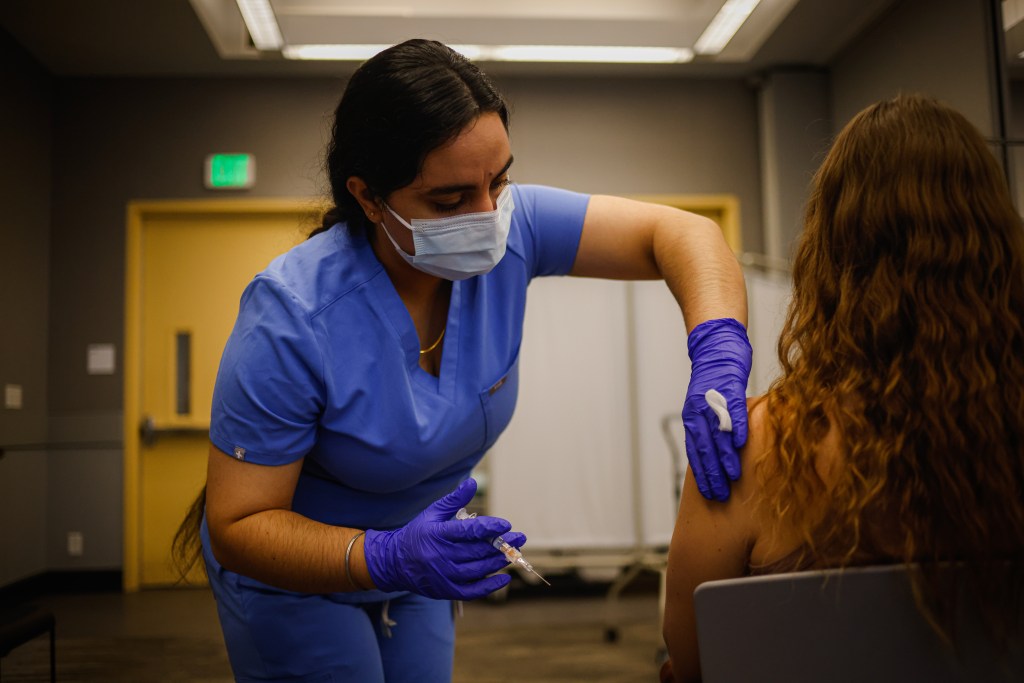Every parent wants to keep their family safe. We want our children to be healthy and enjoy the activities and milestones of adolescence. We yearn to grow old alongside our partners and to celebrate many more birthdays and holidays with our own parents.
This deep-seated desire for safety and togetherness spurred many of us into action when the COVID-19 vaccine first became available more than three years ago. After a year marked by isolation and fear for our loved ones’ health, most Americans eagerly lined up to get their initial shots.

Yet, in 2024, I fear we’ve created a false sense of security. Seventy percent of Americans were fully vaccinated from COVID-19 in 2022, but only 22% got an updated vaccine last year. An updated vaccine — designed to help your body produce antibodies against the most likely currently circulating strains of the virus — offers crucial protection against severe illness, hospitalization and death. Unfortunately, our hospitals are already feeling the strain of declining vaccination rates. Some 34,000 Americans have died from COVID-19 in 2024 alone, with thousands more hospitalized and hundreds succumbing weekly.
Like so many, I felt a wave of relief when my family completed our initial vaccinations. Finally, we could enjoy life with a renewed sense of safety.
Coronavirus dangers
That’s why my family continues to get vaccinated every year. My daughter is receiving her updated COVID-19 vaccine to minimize her chances of falling ill before her high school homecoming dance. My wife, who is battling cancer, knows that a COVID-19 infection could pose severe complications. My elderly parents, both in high-risk categories, receive their vaccinations to protect their health. And as someone who travels frequently for work, I get vaccinated to reduce the risk of bringing the virus home.
Yet almost 80% of the public doesn’t share our sense of urgency. To be frank, the medical and public health community has struggled to effectively communicate the importance of annual COVID-19 vaccinations. Immunity wanes, and the virus mutates; it’s not a one-and-done scenario. People need yearly updates for optimal protection against circulating strains.
Many are underestimating the dangers of remaining unvaccinated. Millions of Americans are at high risk, yet many don’t recognize themselves as such. Approximately 7 in 10 adults have a risk factor for severe COVID-19 symptoms. Conditions such as high blood pressure increase the risk fourfold, while chronic lung diseases raise it sixfold, and diabetes raises it threefold.
The most significant risk factor for poor COVID-19 outcomes remains age: Adults ages 65 and older account for two-thirds of COVID-19 hospitalizations and more than 81% of in-hospital deaths. Alarmingly, only about 40% of Americans in that age group received a COVID-19 vaccine last year.
Time to act
Even healthy adults and children can suffer long-term symptoms from a COVID-19 infection. As a parent, this is one of my greatest concerns. The risk of long-term symptoms, known as long COVID, increases with each infection, even if it’s a mild case. About 7% of U.S. adults — nearly 18 million people — report enduring symptoms such as shortness of breath, extreme fatigue and brain fog. While there is no known cure for long COVID, recent studies indicate that vaccination can reduce the risk of developing these chronic symptoms by up to 70%.
No one wants to miss work, school or cherished moments because of a severe infection or lingering symptoms. We’ve already lost too many special occasions during the peak of the pandemic. We all want to gather safely with loved ones at Thanksgiving, go on planned vacations and celebrate life’s joyous moments, whether it’s weddings or the joy of new babies. We want to visit our loved ones in nursing homes without the fear of causing an outbreak while doing so. We want to gather safely with our friends, and we can do this more assuredly if everyone is vaccinated.
COVID-19 vaccines have been shown to significantly lower risk of hospitalization and death and have been safely administered to billions of people worldwide. As with any health recommendation, it’s understandable that people will have questions about the COVID-19 vaccine — and they should always consult their doctors or trusted health care providers. It’s vital that we take our health seriously, seek answers and engage in compassionate conversations about vaccination.
Updated COVID-19 vaccines are now available nationwide, and the time to act is now. Let’s prioritize our health, protect our loved ones and cherish the moments that matter. Together, we can navigate this ongoing challenge with vigilance and care.
Dr. Jerome M. Adams was the 20th surgeon general of the United States during the Trump administration. ©2024 Chicago Tribune. Distributed by Tribune Content Agency.

















































